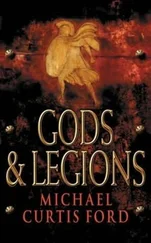John Gladstone - Michael Faraday
Здесь есть возможность читать онлайн «John Gladstone - Michael Faraday» — ознакомительный отрывок электронной книги совершенно бесплатно, а после прочтения отрывка купить полную версию. В некоторых случаях можно слушать аудио, скачать через торрент в формате fb2 и присутствует краткое содержание. Жанр: foreign_antique, foreign_prose, на английском языке. Описание произведения, (предисловие) а так же отзывы посетителей доступны на портале библиотеки ЛибКат.
- Название:Michael Faraday
- Автор:
- Жанр:
- Год:неизвестен
- ISBN:нет данных
- Рейтинг книги:5 / 5. Голосов: 1
-
Избранное:Добавить в избранное
- Отзывы:
-
Ваша оценка:
- 100
- 1
- 2
- 3
- 4
- 5
Michael Faraday: краткое содержание, описание и аннотация
Предлагаем к чтению аннотацию, описание, краткое содержание или предисловие (зависит от того, что написал сам автор книги «Michael Faraday»). Если вы не нашли необходимую информацию о книге — напишите в комментариях, мы постараемся отыскать её.
Michael Faraday — читать онлайн ознакомительный отрывок
Ниже представлен текст книги, разбитый по страницам. Система сохранения места последней прочитанной страницы, позволяет с удобством читать онлайн бесплатно книгу «Michael Faraday», без необходимости каждый раз заново искать на чём Вы остановились. Поставьте закладку, и сможете в любой момент перейти на страницу, на которой закончили чтение.
Интервал:
Закладка:
"When first I evinced a predilection for the sciences, but more particularly for that one denominated electricity, you kindly interested yourself in the progress I made in the knowledge of facts relating to the different theories in existence, readily permitting me to examine those books in your possession that were in any way related to the subjects then occupying my attention. To you, therefore, is to be attributed the rise and existence of that small portion of knowledge relating to the science which I possess, and accordingly to you are due my acknowledgments.
"Unused to the arts of flattery, I can only express my obligations in a plain but sincere way. Permit me, therefore, Sir, to return thanks in this manner for the many favours I have received at your hands and by your means and believe me,
"Your grateful and obedient Servant, "M. Faraday."Now there happened to be lodging at Mr. Riebau's a notable foreigner of the name of Masquerier. He was a distinguished artist, who had painted Napoleon's portrait, and had passed through the stirring events of the first French Revolution, not without serious personal danger, and was now finding a refuge and a home in London. He was struck with the intelligence of the apprentice, whose duty it was to do various offices for him; and he lent the young man his books, and taught him how to make the drawings in perspective which have already been alluded to.
But the lectures in Dorset Street were not the only ones that Michael Faraday attended; and as the Royal Institution is the central scene of all his subsequent history, we must pay a mental visit to that building. Turning from the busy stream of Piccadilly into the quiet of Albemarle Street, we see, in a line with the other houses, a large Grecian façade with fourteen lofty pilasters. Between these are folding doors, which are pushed open from time to time by grave-looking gentlemen, many of them white-headed; but often of an afternoon, and always on Friday evening during the season, the quiet street is thronged with carriages and pedestrians, ladies and gentlemen, who flock through these folding doors. Entering with them, we find ourselves in a vestibule, with a large stone staircase in front, and rooms opening on the right and left. The walls of these rooms are lined with myriads of books, and the tables are covered with scientific and other periodicals of the day, and there are cabinets of philosophical apparatus and a small museum. Going up the broad staircase and turning to the right, we pass through an ante-room to the lecture theatre. There stands the large table, horseshoe-shaped, with the necessary appliances for experiments, and behind it a furnace and arrangements for black-board and diagrams; while round the table as a centre range semicircular seats, rising tier above tier, and surmounted by a semicircular gallery, the whole capable of seating 700 persons. On the basement is a new chemical laboratory, fitted up with modern appliances, and beyond it the old laboratory, with its furnaces and sand-bath, its working tables and well-stored shelves, flanked by cellars that look like dark lumber-rooms. A narrow private staircase leads up to the suite of apartments in which resides the Director of the house. Such is the Royal Institution of Great Britain, incorporated by Royal Charter in the year 1800, "for the diffusing knowledge and facilitating the general introduction of useful mechanical inventions and improvements, and for teaching, by courses of philosophical lectures and experiments, the application of science to the common purposes of life;" – with the motto, "Illustrans commoda vitæ." Fifty or sixty years ago the building was essentially what it is now, except the façade and entrance, and that the laboratory, which was considered a model of perfection, was even darker than at present, and in the place of the modern chemical room there was a small theatre. The side room, too, was fitted up for actual work, though even at mid-day it had to be artificially lighted; and beyond this there was, and still is, a place called the Froggery, from a certain old tradition of frogs having been kept there. The first intention of the founders to exhibit useful inventions had not been found very practicable, but the place was already famous with the memories of Rumford and Young; and at that time the genius of Sir Humphry Davy was entrancing the intellectual world with brilliant discoveries, and drawing fashionable audiences to Albemarle Street to listen to his eloquent expositions.
Among the customers of the bookseller in Blandford Street was a Mr. Dance, who, being a member of the Royal Institution, took young Faraday to hear the last four public lectures of Davy. The eager student sat in the gallery, just over the clock, and took copious notes of the Professor's explanations of radiant matter, chlorine, simple inflammables, and metals, while he watched the experiments that were performed. Afterwards he wrote the lectures fairly out in a quarto volume, that is still preserved – first the theoretical portions, then the experiments with drawings, and finally an index. "The desire to be engaged in scientific occupation, even though of the lowest kind, induced me," he says, "whilst an apprentice, to write, in my ignorance of the world and simplicity of my mind, to Sir Joseph Banks, then President of the Royal Society. Naturally enough, 'No answer' was the reply left with the porter."
On the 7th of October his apprenticeship expired, and on the next day he became a journeyman bookbinder under a disagreeable master – who, like his friend the artist, was a French émigré . No wonder he sighed still more for congenial occupation.
Towards the end of that same October Sir Humphry Davy was working on a new liquid which was violently explosive, now known as chloride of nitrogen, – and he met with an accident that seriously injured his eye, and produced an attack of inflammation. Of course, for a while he could not write, and, possibly through the introduction of M. Masquerier, 2 2 This idea was suggested by some remarks of Faraday to the Baroness Burdett Coutts.
the young bookseller was employed as his amanuensis. This, however, Faraday himself tells us lasted only "some days;" and in writing years afterwards to Dr. Paris, he says, "My desire to escape from trade, which I thought vicious and selfish, and to enter into the service of Science, which I imagined made its pursuers amiable and liberal, induced me at last to take the bold and simple step of writing to Sir H. Davy, expressing my wishes, and a hope that, if an opportunity came in his way, he would favour my views; at the same time I sent the notes I had taken of his lectures." Davy, it seems, called with the letter on one of his friends – at that time honorary inspector of the models and apparatus – and said, "Pepys, what am I to do? Here is a letter from a young man named Faraday; he has been attending my lectures, and wants me to give him employment at the Royal Institution — what can I do? " "Do?" replied Pepys; "put him to wash bottles: if he is good for anything, he will do it directly; if he refuses, he is good for nothing." "No, no," replied Davy, "we must try him with something better than that."
So Davy wrote a kind reply, and had an interview with the young man upon the subject; in which, however, he advised him to stick to his business, telling him that "Science was a harsh mistress, and, in a pecuniary point of view, but poorly rewarding those who devoted themselves to her service." He promised him the work of the Institution, and his own besides.
But shortly afterwards the laboratory assistant was discharged for misconduct, and so it happened that one night the inhabitants of quiet Weymouth Street were startled by the unusual apparition of a grand carriage with a footman, which drew up before the house where Faraday lived, when the servant left a note from Sir Humphry Davy. The next morning there was an interview, which resulted in the young aspirant for scientific work being engaged to help the famous philosopher. His engagement dates from March 1, 1813, and he was to get 25 s. per week, and a room in the house. The duties had been previously laid down by the managers: – "To attend and assist the lecturers and professors in preparing for, and during lectures. Where any instruments or apparatus may be required, to attend to their careful removal from the model room and laboratory to the lecture-room, and to clean and replace them after being used; reporting to the managers such accidents as shall require repair, a constant diary being kept by him for that purpose. That in one day in each week he be employed in keeping clean the models in the repository, and that all the instruments in the glass cases be cleaned and dusted at least once within a month."
Читать дальшеИнтервал:
Закладка:
Похожие книги на «Michael Faraday»
Представляем Вашему вниманию похожие книги на «Michael Faraday» списком для выбора. Мы отобрали схожую по названию и смыслу литературу в надежде предоставить читателям больше вариантов отыскать новые, интересные, ещё непрочитанные произведения.
Обсуждение, отзывы о книге «Michael Faraday» и просто собственные мнения читателей. Оставьте ваши комментарии, напишите, что Вы думаете о произведении, его смысле или главных героях. Укажите что конкретно понравилось, а что нет, и почему Вы так считаете.












